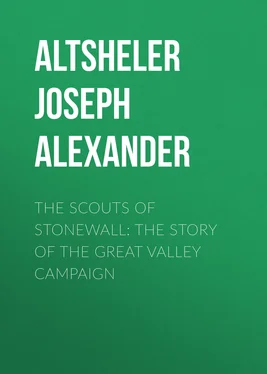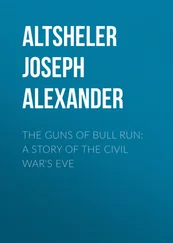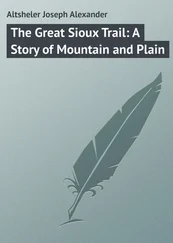Joseph Altsheler - The Scouts of Stonewall - The Story of the Great Valley Campaign
Здесь есть возможность читать онлайн «Joseph Altsheler - The Scouts of Stonewall - The Story of the Great Valley Campaign» — ознакомительный отрывок электронной книги совершенно бесплатно, а после прочтения отрывка купить полную версию. В некоторых случаях можно слушать аудио, скачать через торрент в формате fb2 и присутствует краткое содержание. Жанр: foreign_children, foreign_antique, foreign_prose, prose_military, на английском языке. Описание произведения, (предисловие) а так же отзывы посетителей доступны на портале библиотеки ЛибКат.
- Название:The Scouts of Stonewall: The Story of the Great Valley Campaign
- Автор:
- Жанр:
- Год:неизвестен
- ISBN:нет данных
- Рейтинг книги:4 / 5. Голосов: 1
-
Избранное:Добавить в избранное
- Отзывы:
-
Ваша оценка:
- 80
- 1
- 2
- 3
- 4
- 5
The Scouts of Stonewall: The Story of the Great Valley Campaign: краткое содержание, описание и аннотация
Предлагаем к чтению аннотацию, описание, краткое содержание или предисловие (зависит от того, что написал сам автор книги «The Scouts of Stonewall: The Story of the Great Valley Campaign»). Если вы не нашли необходимую информацию о книге — напишите в комментариях, мы постараемся отыскать её.
The Scouts of Stonewall: The Story of the Great Valley Campaign — читать онлайн ознакомительный отрывок
Ниже представлен текст книги, разбитый по страницам. Система сохранения места последней прочитанной страницы, позволяет с удобством читать онлайн бесплатно книгу «The Scouts of Stonewall: The Story of the Great Valley Campaign», без необходимости каждый раз заново искать на чём Вы остановились. Поставьте закладку, и сможете в любой момент перейти на страницу, на которой закончили чтение.
Интервал:
Закладка:
Not many stragglers were found as they rode on toward the rear, but every regiment increased its speed at sight of the stern general. After circling around the rear he rode back toward the front, and he left Harry and several others to go more slowly along the flanks and report to him later.
When Harry was left alone he was saluted with the usual good-humored chaff by the soldiers who again demanded his horse of him, or asked him whether they were to fight or whether they were training to be foot-racers. Harry merely smiled, and he came presently to the Invincibles, who were trudging along stubbornly, with the officers riding on their flanks. Langdon was as cheerful as usual.
“Things have to come to their worst before they get better,” he said to Harry, “and I suppose we’ve about reached the worst. A sight of the enemy would be pleasant, even if it meant battle.”
“We’re marching on Bath,” said Harry, “and we ought to strike it to-night, though I’m afraid the Yankees have got warning of our coming.”
He was thinking of Shepard, who now loomed very large to him. The circumstances of their meetings were always so singular that this Northern scout and spy seemed to him to possess omniscience. Beyond a doubt he would notify every Northern garrison he could reach of Jackson’s coming.
Suddenly the band of South Carolinians, who were still left in the Invincibles, struck up a song:
“Ho, woodsmen of the mountain-side!
Ho, dwellers in the vales!
Ho, ye who by the chafing tide
Have roughened in the gales!
Leave barn and byre, leave kin and cot,
Lay by the bloodless spade:
Let desk and case and counter rot,
And burn your books of trade!”
All the Invincibles caught the swing and rush of the verses, and regiments before them and behind them caught the time, too, if not the words. The chant rolled in a great thundering chorus through the wintry forest. It was solemn and majestic, and it quickened the blood of these youths who believed in the cause for which they fought, just as those on the other side believed in theirs.
“It was written by one of our own South Carolinians,” said St. Clair, with pride. “Now here goes the second verse! Lead off, there, Langdon! They’ll all catch it!”
“The despot roves your fairest lands;
And till he flies or fears,
Your fields must grow but armed bands
Your sheaves be sheaves of spears:
Give up to mildew and to rust
The useless tools of gain
And feed your country’s sacred dust
With floods of crimson rain!”
Louder and louder swelled the chorus of ten thousand marching men. It was not possible for the officers to have stopped them had they wished to do so, and they did not wish it. Stonewall Jackson, who had read and studied much, knew that the power of simple songs was scarcely less than that of rifle and bayonet, and he willingly let them sing on. Now and then, a gleam came from the blue eyes in his tanned, bearded face.
Harry, sensitive and prone to enthusiasm, was flushed in every vein by the marching song. He seemed to himself to be endowed with a new life of vigor and energy. The invader trod the Southern land and they must rush upon him at once. He was eager for a sight of the blue masses which they would certainly overcome.
He returned to his place near the head of the column with the staff of the commander. Night was now close at hand, but Bath was still many miles away. It was colder than ever, but the wagons had not yet come up and there were no rations and tents. Only a few scraps of food were left in the knapsacks.
“Ride to Captain Sherburne,” said General Jackson to Harry, “and tell him to go forward with his men and reconnoiter.”
“May I go with him, sir?”
“Yes, and then report to me what he and his men find.”
Harry galloped gladly to the vanguard, where the gallant young captain and his troop were leading. These Virginians preserved their fine appearance. If they were weary they did not show it. They sat erect in their saddles and the last button on their uniforms was in place. Their polished spurs gleamed in the wintry sun.
They set off at a gallop, Harry riding by the side of Captain Sherburne. Blood again mounted high with the rapid motion and the sense of action. Soon they left the army behind, and, as the road was narrow and shrouded in forest, they could see nothing of it. Its disappearance was as complete as if it had been swallowed up in a wilderness.
They rode straight toward Bath, but after two or three miles they slackened speed. Harry had told Sherburne of the presence of Shepard the night before, and the captain knew that they must be cautious.
Another mile, and at a signal from the captain the whole troop stopped. They heard hoofbeats on the road ahead of them, and the sound was coming in their direction.
“A strong force,” said Captain Sherburne.
“Probably larger than ours, if the hoofbeats mean anything,” said Harry.
“And Yankees, of course. Here they are!”
A strong detachment of cavalry suddenly rounded a curve in the road and swept into full view. Then the horsemen stopped in astonishment at the sight of the Confederate troop.
There was no possibility of either command mistaking the other for a friend, but Sherburne, despite his youth, had in him the instinct for quick perception and action which distinguished the great cavalry leaders of the South like Jeb Stuart, Turner Ashby and others. He drew his men back instantly somewhat in the shelter of the trees and received the Union fire first.
As Sherburne had expected, few of the Northern bullets struck home. Some knocked bark from the trees, others kicked up dirt from the frozen road, but most of them sang vainly through the empty air and passed far beyond. Now the Southerners sent their fire full into the Union ranks, and, at Sherburne’s shouted command, charged, with their leader at their head swinging his sword in glittering circles like some knight of old.
The Southern volley had brought down many horses and men, but the Northern force was double in numbers and many of the men carried new breech-loading rifles of the best make. While unused to horses and largely ignorant of the country, they had good officers and they stood firm. The Southern charge, meeting a second volley from the breech-loading rifles, broke upon their front.
Harry, almost by the side of Sherburne, felt the shock as they galloped into the battle smoke, and then he felt the Virginians reel. He heard around him the rapid crackle of rifles and pistols, sabers clashing together, the shouts of men, the terrible neighing of wounded horses, and then the two forces drew apart, leaving a sprinkling of dead and wounded between.
It was a half retreat by either, the two drawing back sixty or seventy yards apiece and then beginning a scattered and irregular fire from the rifles. But Sherburne, alert always, soon drew his men into the shelter of the woods, and attempted an attack on his enemy’s flank.
Some destruction was created in the Union ranks by the fire from the cover of the forest, but the officers of the opposing force showed skill, too. Harry had no doubt from the way the Northern troops were handled that at least two or three West Pointers were there. They quickly fell back into the forest on the other side of the road, and sent return volleys.
Harry heard the whistle and whizz of bullets all about them. Bark was clipped from trees and dry twigs fell. Yet little damage was done by either. The forest, although leafless, was dense, and trunks and low boughs afforded much shelter. Both ceased fire presently, seeming to realize at the same moment that nothing was being done, and hovered among the trees, each watching for what the other would try next.
Читать дальшеИнтервал:
Закладка:
Похожие книги на «The Scouts of Stonewall: The Story of the Great Valley Campaign»
Представляем Вашему вниманию похожие книги на «The Scouts of Stonewall: The Story of the Great Valley Campaign» списком для выбора. Мы отобрали схожую по названию и смыслу литературу в надежде предоставить читателям больше вариантов отыскать новые, интересные, ещё непрочитанные произведения.
Обсуждение, отзывы о книге «The Scouts of Stonewall: The Story of the Great Valley Campaign» и просто собственные мнения читателей. Оставьте ваши комментарии, напишите, что Вы думаете о произведении, его смысле или главных героях. Укажите что конкретно понравилось, а что нет, и почему Вы так считаете.












